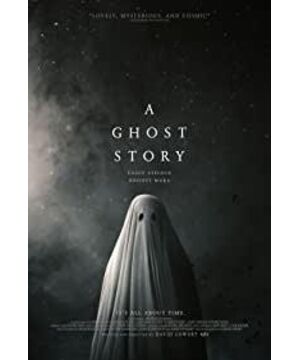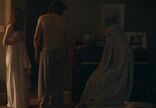A good movie may not need to use too many lines and dialogues. It can tell a good story with just the lens, and everyone can find understanding and resonance in it in their own way.
"A Ghost Story", a ghost story, is not only a ghost story, the director first told us a touching love story.
A couple of lovers live together in a house. The female protagonist M advocates moving because of the inexplicable noise in the house, but the male protagonist C stubbornly refuses to move out. They had quarreled about this. In C's opinion, this house has the "history" they have been together, the books they have read together, the music they listened to, the sofa they played together, the piano they played together, and all the things they loved each other. trace.
Maybe love is a compromise. They embraced each other and fell asleep at night. C kissed M and said, we can leave. The director took a long overhead shot and stayed in the warm kiss of the two. I never thought that this would be their last 's preservation.
C was unfortunately killed in a car accident. The director used Hou Hsiao-hsien's camera perspective, separated by two doors, and placed M in front of the hospital bed with a deep depth of field, watching his beloved husband lying in front of him, but maintaining a restrained calm .
When she got home, she tried to divert her attention by doing housework, but her heart was as heavy as lead. While washing dishes, she threw the dishcloth into the trash by mistake, and slipped on the floor after holding the chocolate pie. Put it in your mouth. In another five-minute long shot, the director let us watch her swallow the pain into her stomach without chewing one bite at a time and then spit it all out, but she didn't let us see the tears swirling in her eyes.
But C quietly stood by and looked at them all but could not do anything. Only when she was lying alone on the double bed that the two of them once snuggled up, he tapped her shoulder, but she could no longer perceive that he was coaxing her to sleep.
It turned out that C became a ghost in a white sheet, walked through the sunshine-filled field, and returned to their home like a call of fate. Since then, he has become a prisoner of love.
He watched her hurt, recover, form a new love, reminisce about the past, the warm memories collided with the cool reality, and finally left the old house, and left a note in the crevice of the painted wall, and the note represented part of her. Since then, the note has become his obsession day after day, year after year.
The director used the classic academy-style rounded rectangular lens and the vignetting-style corners of the screen to reveal a sentimental retro feeling, and the framed composition trapped the bed sheet ghost in his inner obsession.
In the first half of the film, we witnessed the slowdown of time, and in the second half of the film, we experienced the fast-forward and reverse of time, and time and survival are just an important topic that director David Lowe wants to discuss with us.
The subtly moving light spots on the wall and the unpredictable nebula overhead suggest the unpredictable travel of time for thousands of years. The clever use of montage speeds up the timeline. The ground rises, time is a closed loop, and the Sheet Ghost struggles to get back to where he was - when he and M first moved into the house.
He saw his past self watching M leave again. This scene reminded me of "Boyhood", when girls and boys moved out of the old house, they said goodbye to the objects in the house over and over again, as if saying goodbye to their past self. It's like the heroine M said to the hero C, "When I was young, my family moved around a lot, I would write notes, fold them very small, and hide them in every corner. If I want to go back one day, There will be a part of who I once was waiting for."
Countless past mes have made me who I am now. In "Yi Yi", Wu Nianzhen went back to the past and experienced his first love, but he said, "I thought I might have a different life, but the result is still the same, no difference, but suddenly I feel that there is no need to live again." .
Look back at the dialogue between the male protagonist and the female protagonist about moving.
Did you go back?
No, because I have no reason to go back.
Why did you move and why did you leave those houses?
Because I have no choice.
Because in the past there was no need to go back and she couldn't go back, the old one stayed in the old room, and the new one had already set off. But he held the old her and stayed in the same place after experiencing the passage of time.
I really like the Chinese translation of the film "Ghosts of Floating Life". "Floating Life" expresses the values of the nihilistic director David Lowe. As Lao Tzu said, "It's life is like floating, and its death is like rest. Don't think about it, don't plan. It is bright but not dazzling, trusting but not expecting. His sleep is not dreaming, his sleep is worry-free. His spirit is pure, and his soul is unstoppable.”
The director expresses his views on time and existence in the tone of a party philosopher: we do everything we can to keep us alive, to ensure that after our death, we will still have an impact on the surrounding, but we will all die, our descendants, descendants Descendants of yours and even the whole world will disappear, everything will perish, including everything you have fought for, everything that makes you complacent or superior to others, will all vanish.
Yes, immortality does not lie in the memory of others, nor in the works we leave behind, but in every present that is happening.
The only thing that can be grasped is not the unpredictable future nor the past that can never be traced back, but the graspable and palpable present.
The bed sheet ghost finally pulled out the note she hid in the crack of the wall, but the content of the note is no longer important, losing the day-to-day longing, what is the use of the body?
View more about A Ghost Story reviews











